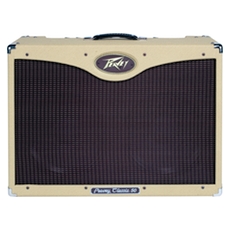 The Peavey Classic 50/212 truly is a classic amplifier, with a pedal-friendly clean sound that’s hard to beat – versatile and powerful.
The Peavey Classic 50/212 truly is a classic amplifier, with a pedal-friendly clean sound that’s hard to beat – versatile and powerful.
Peavey Classic amplifiers are some of the most hardworking amplifiers in the business, which is only fitting considering Hartley Peavey is one of the hardest working designers in the music business. These working-man powerhouses are some of the best amplifiers around at any price, much less at the extremely affordable prices they sell for. With all the talk today about boutique this and hand-wired that, it’s nice to see a company still offer a tube amplifier made in America at a fair price with some excellent sounds for the working musician. Let’s see what makes this classic amplifier so classy.
Specifications
The Peavey Classic 50/212 is a 50 watt combo amplifier with 2 12″ Peavey Blue Marvel speakers. The preamp is powered by three 12AX7 tubes, the power amp by four EL84s. The fan-cooled amplifier features two channels with shared passive EQ (bass, middle, and treble) and an active presence control. Both normal and bright inputs are available. It also features a master reverb control, effects loop, standby switch, and included footswitch for changing channels or defeating the reverb. The chassis is covered in chrome whereas the cabinet is tweed. Unpacked, it weighs close to 60 lbs.
Performance
I’ll start here by saying I have used a Peavey Classic 50 (along with a Classic 30) as one of my main gigging amps for several years. While it’s not the most feature-laden amp you’ll find, it’s hard to match its reliability or classic tones.
In my view, the Classic 50 has two strengths. If you’re like me and get most of your overdrive and distortion sounds from effects pedals, then you’re always on the lookout for a great clean sound that translates the sounds of your pedals. That is, you want an amp that is “pedal friendly.” Well, it doesn’t get much friendlier than the Peavey Classic 50. The clean sound is fat, clear, round, and responds well to the onboard eq. I was impressed by the included Blue Marvel speakers, though less impressed with the stock tubes, and opted for JJ Tubes replacements.
With the tube swap, the clean sounds from the Classic 50 are up there with the best sounds from Fender and Vox. On its own, this is a sound that can be used for country, jazz, or R&B easily. When you add your favorite effects pedals, the clean channel can easily be morphed into a high gain monster. The 2×12 configuration definitely helps in this regard. Suffice it to say, the clean channel on the Peavey Classic 50 is one of the best you’ll find. The onboard reverb sounds pretty good on this channel, though only at lower levels. Higher levels of reverb tend to sound a bit washed out.
That’s not to say, though, that the overdrive channel should be ignored. It’s not a metal setting, that’s for sure; however, for roots rock, classic rock, or blues, the overdrive sound is very smooth. Again, the new tubes helped this setting tremendously. I also ran a Boss delay pedal through the onboard effects loop with this channel and was impressed by the loop’s quiet operation.
The only possible downside to this amp would be in a recording situation because the onboard fan runs 100% of the time, which does add a bit of ambient noise, but I did test out recording with the amp and didn’t notice any game-stopping fan noise. Still, I think the Classic 50 is probably best suited for live use, but that’s probably what the average user will buy it for anyway.
Final Thoughts
The old saying “if it ain’t broke, don’t fix it” certainly applies to the Peavey Classic 50/212. The amp has only experienced some minor cosmetic changes in the past few years because, let’s face it, there’s not much to improve upon. The Peavey Classic 50/212 truly is a classic amplifier, with a pedal-friendly clean sound that’s hard to beat – versatile and powerful.
Name of Gear: Peavey Classic 50/212
List Price: $1149.99
Manufacturer Info: Peavey Electronics, peavey.com
Pros: Excellent clean and overdriven sound; very pedal friendly; superior warranty and support; great deal
Cons: Reverb a bit uninspiring; stock tubes not so great